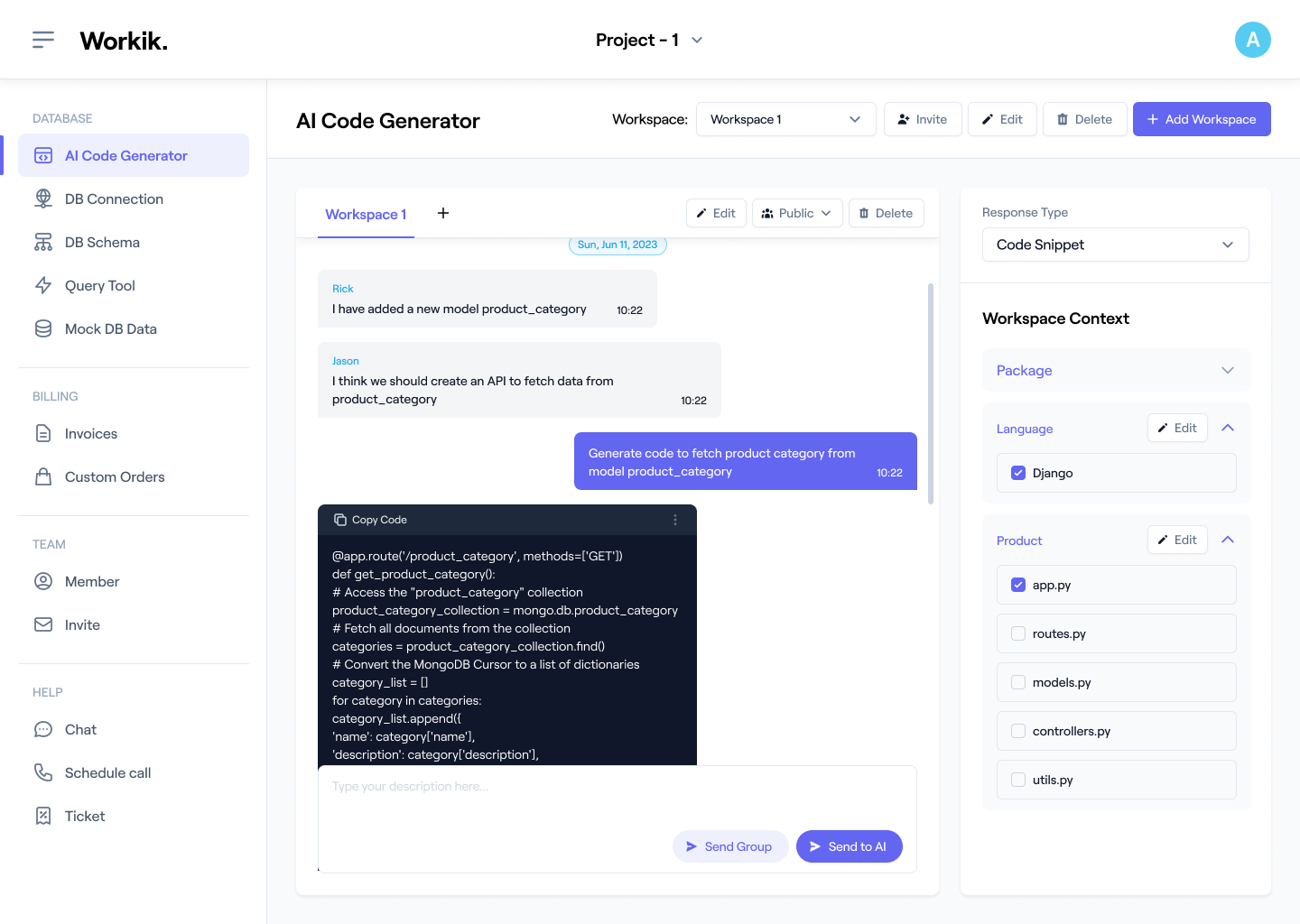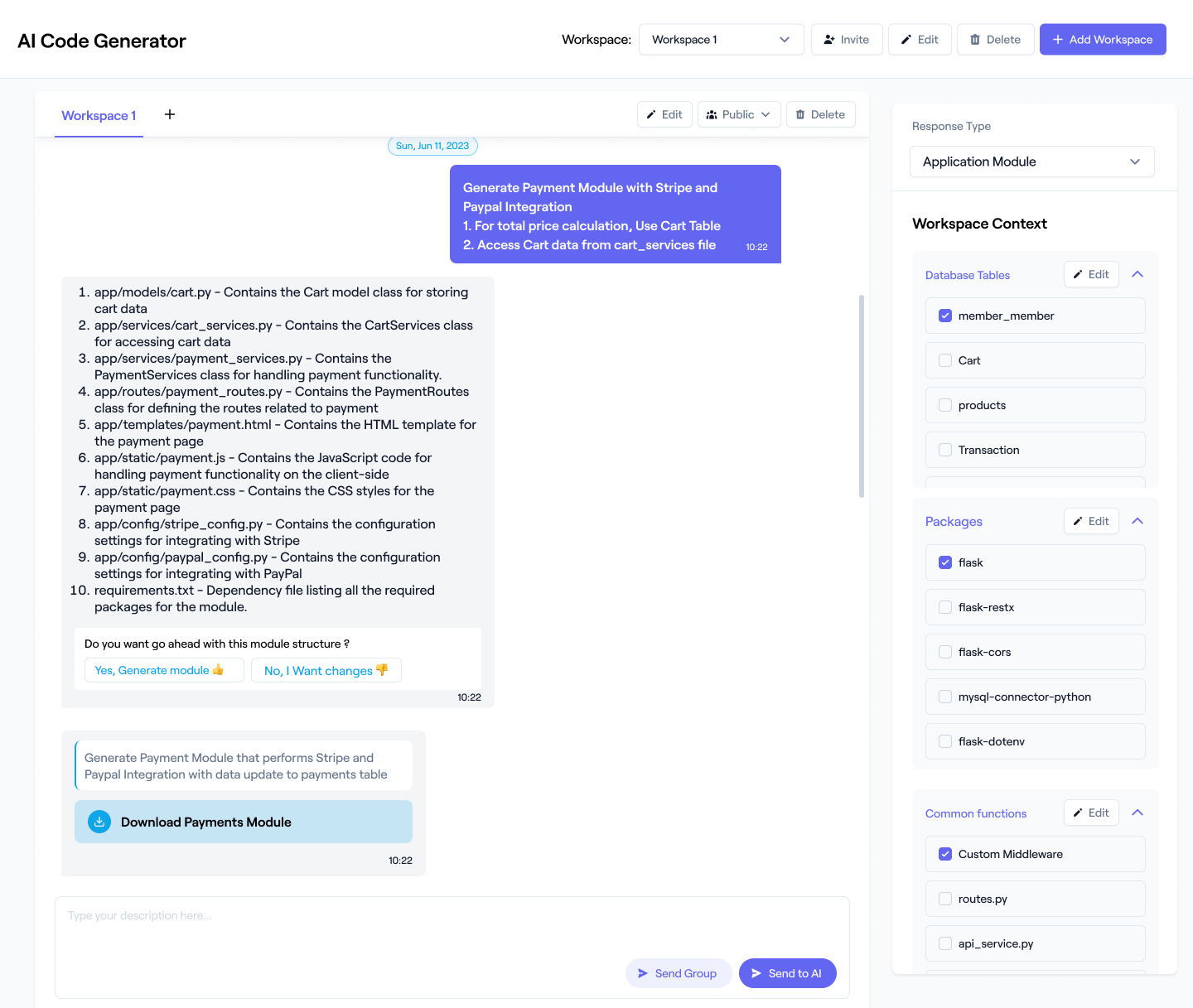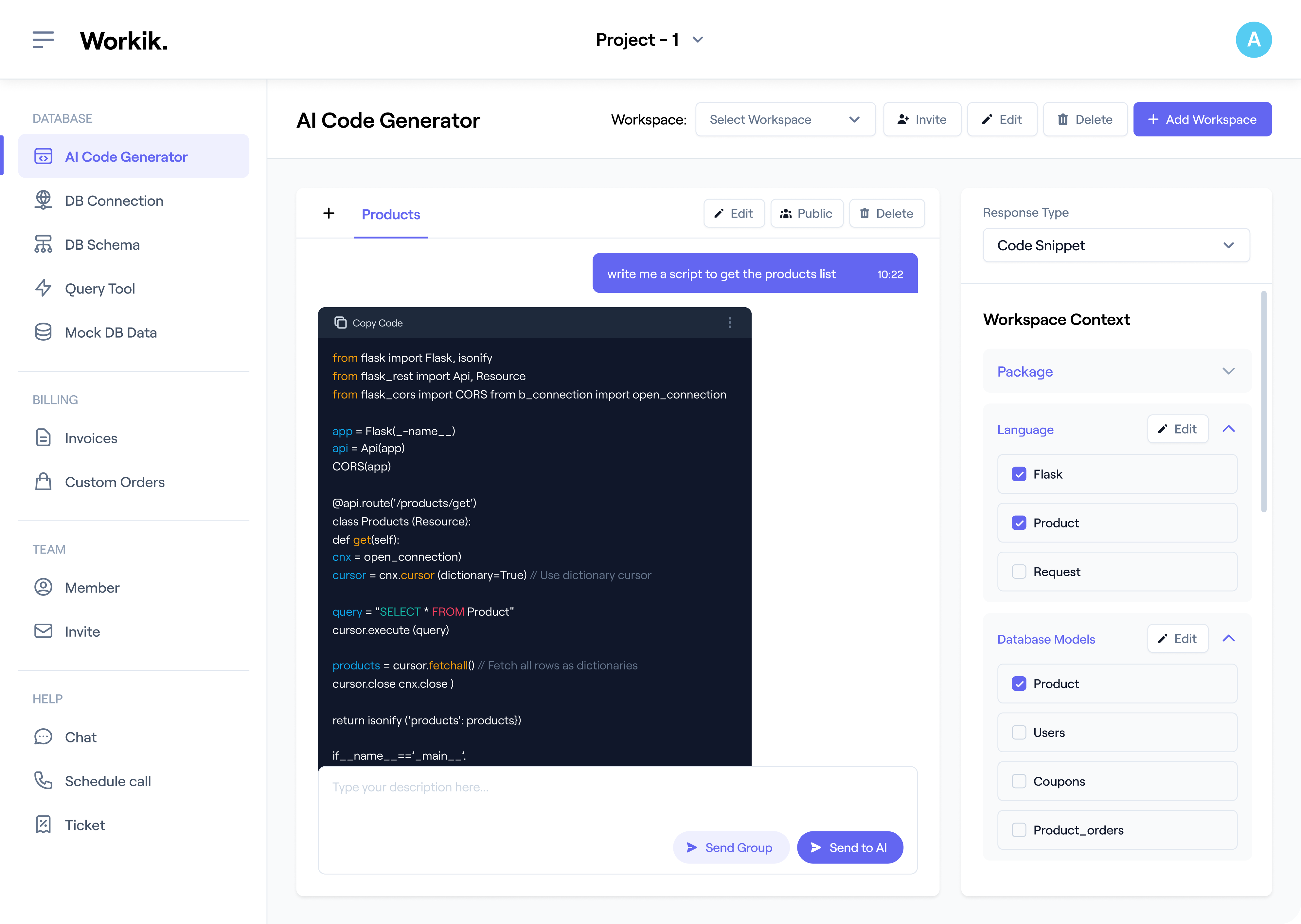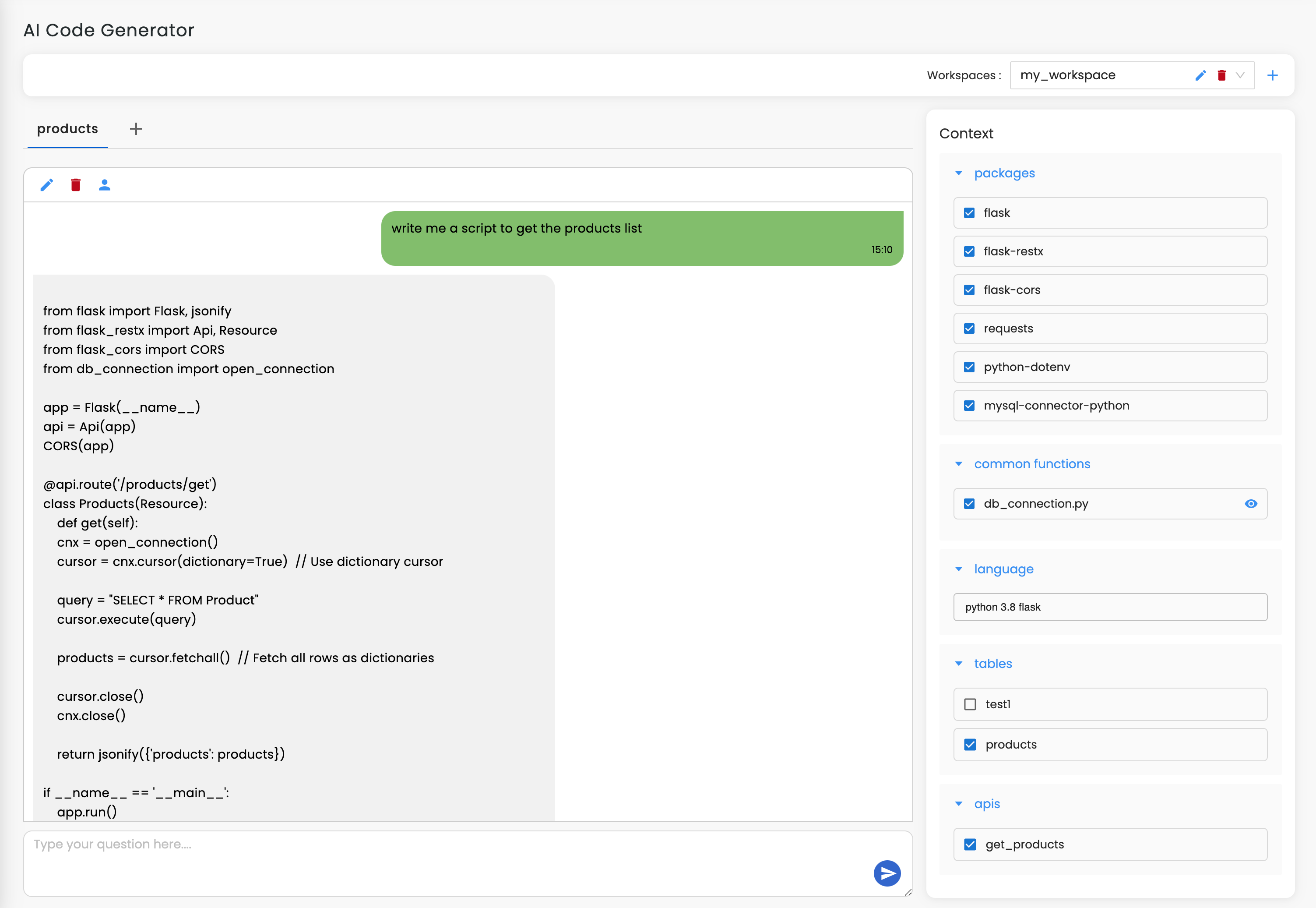
Join our community to see how developers are using Workik AI everyday.
Features

Streamline Network Configuration
AI generates TCL scripts with Expect, simplifying device setups and reducing deployment errors.

Enhance GUI Development
Build efficient Tk GUIs by automating layout and event handling, speeding up cross-platform UI creation using AI.

Enhance Test Automation
Accelerate testing workflows by using AI to generate TCL test scripts for environments like NS and VMD.

Simplify Database Management
AI handles TCL database tasks with Oratcl, generating optimized queries for seamless, secure database operations.
How it works
Create a free Workik account in seconds to unlock AI-powered TCL automation tools.
Sync with GitHub, GitLab, or Bitbucket repositories. Specify TCL contexts like Expect scripts, Tk, database schemas & more to customize AI-generated TCL code to your project’s needs.
Use AI to generate TCL scripts, whether for network automation with Expect, GUI development with Tk, or automated testing with Tcllib.
Leverage AI to test your TCL code, verify functionality, and optimize scripts for deployment.


Expand


Expand


Expand


Expand


Expand


Expand


Expand


TESTIMONIALS
Real Stories, Real Results with Workik
TCL scripting with Expect is now lightning-fast. What used to take hours is done in minutes!

Zaeden Smith
Senior Network Engineer
Tk GUIs are a breeze with Workik AI generating flawless TCL code. I can focus entirely on design!

Logan Miller
Software Developer
AI-boosted TCL test scripts with Tcllib have significantly improved our testing efficiency!

Kate McKnight
Test Automation Lead
What are some popular use cases of Workik's AI-powered TCL Code Generator?


Some popular use cases of Workik's AI-powered TCL Code Generator include but are not limited to:
* Generate TCL scripts for network automation and device management with Expect.
* Build cross-platform GUI applications using Tk.
* Automate test cases and system simulations with tools like Tcllib and NS.
* Manage large databases with TCL scripts for Oratcl, handling queries and transactions.
* Create TCL scripts for hardware testing and diagnostics.
* Optimize real-time memory management in embedded systems and IoT devices.
* Simulate protocols for testing network communication layers.
* Automate data parsing with TCL libraries like tDOM or TclXML.
* Develop event-driven TCL scripts for workflows and task queues.
* Build TCL-based web applications with frameworks like Rivet or TclHttpd.
What context-setting options are available in Workik’s AI for TCL Code Generator?


Workik provides various context-setting options to customize AI-generated TCL code. Users can:
* Import TCL scripts from GitHub, GitLab, or Bitbucket.
* Add frameworks like Expect, Tk, Oratcl, or Tcllib for precise code generation.
* Upload database schemas for TCL-based query and transaction handling.
* Define custom TCL functions or snippets to enhance AI-generated scripts.
* Include API endpoints to automate external system interactions.
* Set test case scenarios for generating TCL scripts with tools like NS.
* Add event-driven contexts to create responsive TCL scripts.
* Specify GUI needs to generate TCL scripts with Tk for user interfaces.
Can Workik’s AI assist with TCL script modularization?


Yes, Workik AI can split complex TCL scripts into modular components, making them easier to manage and reuse. This is particularly useful for large projects involving network automation or GUI development, where maintaining separate reusable modules enhances scalability.
Can Workik AI create TCL scripts for custom logging and monitoring?


Yes, Workik AI generates TCL scripts for custom logging systems, helping developers track system performance, debug errors, and maintain logs efficiently.
Can Workik AI help generate TCL scripts for cross-platform compatibility?


Absolutely. Workik AI ensures TCL scripts are cross-platform by identifying platform-specific differences and generating adaptable code. This is particularly helpful for Tk GUIs or database scripts that run across Windows, macOS, and Linux.
Can Workik AI assist in creating TCL scripts for simulation tools?


Absolutely. Workik AI generates scripts tailored for tools like NS (Network Simulator) or other simulation platforms, automating scenarios, data collection, and validation processes.
Can Workik AI recommend TCL best practices during script generation?


Yes, Workik AI embeds TCL best practices in the generated scripts, such as using namespaces for code modularity, proper error handling with catch, and efficient memory usage in long-running processes.
Does Workik AI generate TCL scripts for secure operations?


Yes, Workik AI incorporates security best practices, such as input validation, sanitization, and encryption handling, ensuring scripts are safe for sensitive environments.
Generate Code For Free

TCL: Question & Answer
TCL (Tool Command Language) is a flexible, high-level scripting language used in automation, networking, and embedded systems. It excels in fast prototyping and is popular in telecommunications, hardware testing, and GUI development for its ease of integration and extensibility.
Popular languages, frameworks, and libraries used with TCL include:
Languages:
TCL, C, C++, Python
Automation & Testing:
Expect, Tcllib
GUI Development:
Tk
Database Interaction:
Oratcl, SQLite
Network Simulation:
NS (Network Simulator)
Web Development:
Rivet, TclHttpd
Embedded Systems:
TclBlend (TCL and Java Integration)
Data Parsing:
tDOM, TclXML
Some popular use cases of TCL include, but are not limited to:
Network Automation:
Automate network device management and diagnostics with Expect.
Test Automation:
Generate automated tests for hardware/software systems with Tcllib and NS.
GUI Applications:
Build cross-platform GUIs using Tk for desktop or embedded systems.
Database Management:
Manage databases with Oratcl for querying and transaction handling.
Embedded Systems:
Use TCL for automation in embedded applications.
System Simulation:
Automate network and system simulations with NS.
Career roles include TCL Developer, Network Automation Engineer, Test Automation Specialist, Embedded Systems Engineer, and Database Administrator. These roles are vital in telecommunications, network management, and software development.
Workik AI streamlines TCL development by:
Code Generation:
Automate TCL scripts for network automation, GUIs, and testing.
Debugging:
Resolve TCL script issues with AI-driven insights.
Performance Optimization:
Enhance TCL script performance for networks and databases.
Refactoring:
AI refactors TCL scripts for better structure and maintainability.
Automation:
Generate test cases, refactor scripts, and automate documentation.
Network Automation:
Optimize Expect scripts for network tasks.
Database Integration:
Improve Oratcl for efficient database operations with AI.
Documentation:
Automatically generate detailed TCL project documentation.
Deployment:
Streamline TCL deployment for embedded systems and networks.
Explore more on Workik
Get in touch
Don't miss any updates of our product.
© Workik Inc. 2026 All rights reserved.

